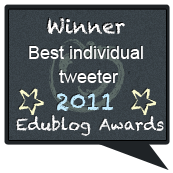For the next several weeks I’ll be sharing posts that you can use for your summer learning. School may be out for many but the learning we do as educators can last even outside the classroom. These posts will take us through several different ways of extending your learning. We started with Twitter chats and how you can participate in real time or whenever you want. Then we examined some ideas on how to get the most out of any conference you attend this summer or beyond. Today move to some non-educational books that you can use to grow as a learner and a professional. Then I’ll give you some ideas on how to better engage parents this upcoming school year. Finally we will finish the series by looking at some new and exciting tools to try in your classroom. Each post will offer up some basic information along with several learning challenges you can undertake. Happy Learning!
Spending lots of time on airplanes and in airports means I have a great deal of time on my hands. If I’m not prepping for a keynote, working on a presentation or compiling some data I’m reading. I keep a constant supply of books at arms length and believe it or not most of them aren’t educational books. I do find time to read content or theory but I find more and more it’s the non-educational books provide more to my learning because it causes me to reflect on how the subject matter c0uld apply to the work I am doing with administrators and teachers.
There are lots of great list of educational summer reading. This one from ASCD is full of texts I find on my own bookshelf. Here is another one. And another one. Some have lots of value others are just there to push books.
The thing to remember is, just like in the classroom, read what provides value to you. If educational books are your thing, awesome. If you are looking for a good beach read to escape, even better. Whatever you read, do it often. Reading is the foundation of learning and we all should be doing it more.
Here are 5 books that I’ve read recently that have seemingly no connection to education but have had influence on my work and my thinking as an educator and learner.
Everybody Lies: Big Data, New Data, and What the Internet Can Tell Us About Who We Really Are-This book from Seth Stephens-Davidowitz, a former data scientist at Google writes about how data, specifically Google Trends can tell us a lot about who we are as people and a society. Comparing the answers given to popular surveys Seth concludes that what we say to our friends and ourselves and what we ask Google are two totally different things. Using that data he can predict presidential elections, relationship habits and more. I have been using many of the data points here to talk to administrators about the use of social media and how data can skew what we know about the world.
Psyched Up: How the Science of Mental Preparation Can Help You Succeed-This was my most recent read and a great one. Daniel McGinn takes us through all the research around getting prepared for major events in our lives. Giving examples from sports, performance arts, medicine and more we learn that there is scientific evidence to suggest that pep talks don’t work, listening to music while you run or work is about the worst thing you can do and how to overcome a fear or speaking or presenting. I found I was doing a lot of things wrong in my own life and especially with my kids. We have to believe we will do well and data suggests, we will.
The Checklist Manifesto: How to Get Things Right-Suggested to me by a good friend I was skeptical of this one at first. I have tried and failed about 1000 times to get organized and this seemed like another one of these books to tell me what I was doing wrong and how to do it better. And while it was that kind of book, it wasn’t my methods, it was my mindset. Since I’ve read it (twice now in 6 months) I find myself taking lots away each time to help me be more productive and how to shift my mindset on how I am organized. A quick and easy read.
Confessions of an Advertising Man-This one might be the most unusual book on my list but it is hands down my favorite I’ve read in a very long time. With chapters like “How To Start An Advertising Agency” and “How To Get Your First Client” it might not seem like there is anything to learn here unless you want to be in Mad Men. But seriously, if you are interested at all in creativity and leadership, you need this book. First published in 1963 it has long been considered the bible for ad agencies. However for me it was eye opening to see how someone who was once called the most creative man on the planet sought out talent, organized teams and was hyper-focused on tasks at hand. I have already read this one again and constantly keep coming back to parts of it to use in my work with administrators.
Option B: Facing Adversity, Building Resilience, and Finding Joy- Sheryl Sandberg is the COO of Facebook and already an accomplished author. In this book she opens up about the sudden death of her husband and how she found herself a single mother of two children. But she writes of resiliency and how when things don’t always go the way we plan we need to be ready with option b, or c, or whatever. She blends personal story with research on how we all deal with adversity and how it’s a strength we can all build.
Spending lots of time on airplanes and in airports means I have a great deal of time on my hands. If I’m not prepping for a keynote, working on a presentation or compiling some data I’m reading. I keep a constant supply of books at arms length and believe it or not most of them aren’t educational books. I do find time to read content or theory but I find more and more it’s the non-educational books provide more to my learning because it causes me to reflect on how the subject matter c0uld apply to the work I am doing with administrators and teachers.
There are lots of great list of educational summer reading. This one from ASCD is full of texts I find on my own bookshelf. Here is another one. And another one. Some have lots of value others are just there to push books.
The thing to remember is, just like in the classroom, read what provides value to you. If educational books are your thing, awesome. If you are looking for a good beach read to escape, even better. Whatever you read, do it often. Reading is the foundation of learning and we all should be doing it more.
Here are 5 books that I’ve read recently that have seemingly no connection to education but have had influence on my work and my thinking as an educator and learner.
Everybody Lies: Big Data, New Data, and What the Internet Can Tell Us About Who We Really Are-This book from Seth Stephens-Davidowitz, a former data scientist at Google writes about how data, specifically Google Trends can tell us a lot about who we are as people and a society. Comparing the answers given to popular surveys Seth concludes that what we say to our friends and ourselves and what we ask Google are two totally different things. Using that data he can predict presidential elections, relationship habits and more. I have been using many of the data points here to talk to administrators about the use of social media and how data can skew what we know about the world.
Psyched Up: How the Science of Mental Preparation Can Help You Succeed-This was my most recent read and a great one. Daniel McGinn takes us through all the research around getting prepared for major events in our lives. Giving examples from sports, performance arts, medicine and more we learn that there is scientific evidence to suggest that pep talks don’t work, listening to music while you run or work is about the worst thing you can do and how to overcome a fear or speaking or presenting. I found I was doing a lot of things wrong in my own life and especially with my kids. We have to believe we will do well and data suggests, we will.
The Checklist Manifesto: How to Get Things Right-Suggested to me by a good friend I was skeptical of this one at first. I have tried and failed about 1000 times to get organized and this seemed like another one of these books to tell me what I was doing wrong and how to do it better. And while it was that kind of book, it wasn’t my methods, it was my mindset. Since I’ve read it (twice now in 6 months) I find myself taking lots away each time to help me be more productive and how to shift my mindset on how I am organized. A quick and easy read.
Confessions of an Advertising Man-This one might be the most unusual book on my list but it is hands down my favorite I’ve read in a very long time. With chapters like “How To Start An Advertising Agency” and “How To Get Your First Client” it might not seem like there is anything to learn here unless you want to be in Mad Men. But seriously, if you are interested at all in creativity and leadership, you need this book. First published in 1963 it has long been considered the bible for ad agencies. However for me it was eye opening to see how someone who was once called the most creative man on the planet sought out talent, organized teams and was hyper-focused on tasks at hand. I have already read this one again and constantly keep coming back to parts of it to use in my work with administrators.
Option B: Facing Adversity, Building Resilience, and Finding Joy- Sheryl Sandberg is the COO of Facebook and already an accomplished author. In this book she opens up about the sudden death of her husband and how she found herself a single mother of two children. But she writes of resiliency and how when things don’t always go the way we plan we need to be ready with option b, or c, or whatever. She blends personal story with research on how we all deal with adversity and how it’s a strength we can all build.










